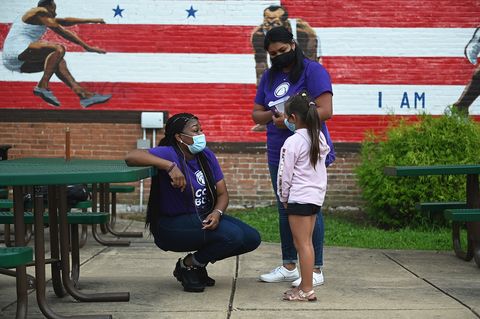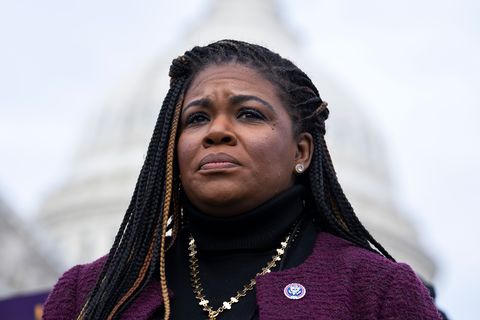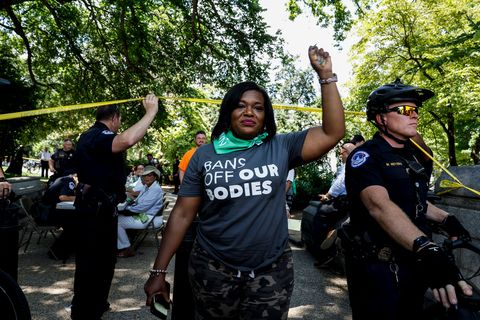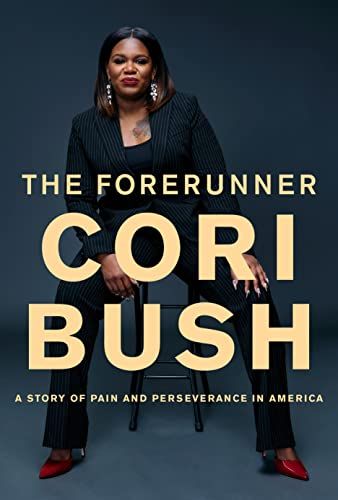Products You May Like
Cori Bush signs the prologue to her new memoir, “Your Congresswoman loves you.” As The Forerunner: A Story of Pain and Perseverance in America details, she loves people of color, immigrants, queer people. She loves parents forced to choose between food and housing and the children that are suffering in foster care. She loves teachers and students, the jobless and the unhoused. She loves all these people and, at times in her life, she’s been some of them.
Since becoming the representative for Missouri’s 1st US congressional district in 2020, Congresswoman Bush has established herself as a nontraditional lawmaker. She’s Missouri’s first Black Congresswoman, likely the state’s first nurse to serve in DC and a Black Lives Matter activist bringing a new perspective to politics. She’s made graceful overtures to her constituents in revealing her personal experiences with abortion, abuse, and poverty, but The Forerunner moves things forward another step. Bush, a nurse and pastor who is 46 and a lifelong Missourian, tells the full story of her life to date, with all the heartbreaks and triumphs. She also seamlessly connects her struggles, which are the struggles of so many, to what she’s reaching to achieve legislatively.
Bush’s belief in the need for a living wage was strengthened by her battles with poverty. Her difficulty affording college shaped her determination to make higher education accessible for Americans. The powerlessness she felt during an abortion made her determined to ensure the procedure be offered to everyone in safe, comfortable, and respectful conditions.
The Forerunner recalls a period Bush spent living with her two tiny children and then-husband in a 1996 Ford Explorer. The family’s belongings were kept in trash bags, the backseat was folded up to allow space for the playpens in which the babies slept. “We learned how to attract as little attention as possible. We parked on a street in a residential neighborhood, in a space between two homes, never directly in front of one. That would be too suspicious. We never stayed in the same place all night,” she writes. Bush was able to transition into more secure housing but knows so many others weren’t. In 2021, she introduced an “Unhoused Bill of Rights” and protested evictions on the Capitol steps.
Congresswoman Bush shared with ELLE.com what called her to write The Forerunner, why the housing crisis has reached such a critical point, and what stakes this November’s midterm elections carry.
I’ve known that I would write a book since I was 16. I write about being given a journal and a pen by my ex-boyfriend’s mother years ago. I started journaling immediately and I actually filled up two journals within the next few years. Then, a few years later decided, ‘Okay, it’s time for me to write the book.’ But I just couldn’t figure out what was supposed to be the heart of the book.
Then running for this seat, so much more happened. The thing is, I would get the criticism. ‘Why are you pushing so hard? Why do you keep driving these same issues? Slow down, you’re doing do too much.’ Or ‘Those things aren’t necessarily the priority. Those are just progressive talking points, Medicare for All and Housing for All, and a livable wage and free college tuition.’ I knew that having that moment in time was so triumphant. Me, finally winning the race and becoming the first woman to ever hold the seat in my district and become the first Black woman to ever hold this seat in the state and the first nurse in the state, as well as the first activist to fight for Black lives to win the seat, I knew that gave [the book] more heart.
I hope readers take away from it that people who have gone through trauma, people who have lived through many hardships in their lives are still of value to society and are still worthy and deserving of dignity and respect just like anyone else. Society just does not prioritize the trauma healing that’s needed to be able to help people who’ve gone through domestic violence, sexual assault, police violence, and living through poverty. Well, we need to change that narrative. The way to change that narrative best is to make sure that we have people with that lived experience helping to build and transform policy.
Housing issues have been around since far before anyone can remember. Being unhoused is not a new thing, but it is still a thing. And it has grown and grown to the point where hundreds of thousands of people around the country continue to sleep on the street at night because we have not properly addressed it, because we won’t make the investment to be able to fix the problem. That would look like, taking five years to build the affordable housing stock for people to be able to have affordable homes, but then also [figuring out] how we’re using resources and programs to wrap around people and families so that they can acquire those homes.
We treat our unhoused community members as if they’re not human beings. When I was living in the car, I chose not to go into a shelter because I felt like at least we have a vehicle. We have a car, we have a place where we can sit down, a place where we can lay and where we can keep our stuff and where we can be dry if it rains. There are other people who don’t have that, so why take up space [in a shelter] from those that need that? But being out there taught me a lot. It taught me that you can’t say who will be unhoused. There’s no person or family deserving to be unhoused. It can happen to anyone. Just days before I became unhoused, I never would’ve thought that I would be living out of a car. That’s why I have a resolution to address the housing crisis and fix it by 2025. It’s going to take housing being a priority for everyone versus seeing it as a burden on society.
The lockdown made the situation tougher for those that were transient or those that were living with family members. It was harder for those families and those parents because now the children were at home throughout the day, which meant that they needed to have the supplies and the equipment for them to have to be in school at home, the WiFi, but also the food to be able to have breakfast, lunch and dinner every day. For our students and families that were unhoused, it posed even a greater [crisis] because they needed to continue with school while they were now trying to live in a shelter or a shelter space all day, every day. That proved to be really a difficult situation that I don’t know was properly addressed. But a lot of school districts did the work to try to make sure that if they knew that there was a child or a family that was unhoused they were connecting them to resources.
We have to look at how evictions happen. The housing crisis is getting worse and worse. We’re seeing an increase in rent all across the country, where rent is going up by hundreds of dollars, not by $100 or $30 or $60. We are seeing homes and apartments being purchased by corporations and not people. They’re purchasing the affordable housing stock and to the point to where people can’t afford it.
There are so many things that lawmakers can do. We can fully fund programs that help people to be able to purchase homes, that help people to get to work on their credit to be able to purchase homes, giving people the money for the down payment and closing cost to be able to purchase the homes, putting financial literacy in our schools and making that a part of learning.
In St. Louis, there was once this big push to close a local 24-hour emergency shelter. It was the only 24-hour emergency shelter in St. Louis. The big push, which was by the incoming mayor and also some other politicians as well as some business leaders, to close this shelter and also to find a place to move the folks that are unhoused from certain areas of the community. We were told that was part of the beautification of the city. We protested the closing of that facility and we were very clear with the current administration and the incoming mayor that that’s not something that the community wanted. We kept that pressure up to make sure that they handled that situation in a more dignified manner. There are elected officials who need to see our unhoused community members as whole people.
Regardless of how much crime there is in a community, crime is happening more by people who have a home or live in a home. For people to feel like, ‘Oh, it’s our people who are unhoused that are doing all of this crime,’ [is inaccurate]. But the other thing is, is should we be laying blame and burden on those who are marginalized and struggling and hurting? Or should we be doing the work to see how they are marginalized, who’s marginalizing them and how can they be helped? So that is where we miss it. I’m not one to agree with the fact that it’s our homeless community members that are out here doing all of this crime. Could it be some? Absolutely, the same way that there are politicians and rich folks that do crime. When you can help someone by making sure that they have housing, making sure that they have a good paying job, that their children are safe, that they have a home and food in the refrigerator, when you can help folks that way? Lives change that way. We have to remember that these folks live and breathe and they’re human and it could be any one of us any day. Even though I am in Congress and even though I don’t make $9 an hour anymore and my children are older and have their own jobs, it still is a very real thing to me that to remember that one day I could again find myself unhoused because I found myself there before.
In November, we have to keep the House, we have to keep the Senate. What’s at stake is [the threat of] Republican candidates, some of whom are extremists in their views, some have expressed views that are bigoted. We don’t need more of that in Congress. What I’ve been saying is Roe the Vote. If we don’t show up and Roe the Vote, what we’re looking at is a possible national ban on abortion, a ban on contraception, a possible national ban on marriage equality. That’s just a start. What’s also at stake is our democracy. We can’t allow the insurrection to be wiped away as if, like one of my colleagues said, it was a tourist visit. If we don’t hold the House and expand the Senate with Democrats, the insurrection will get sworn into Congress in January.
So many people have said, ‘You are like me.’ So they feel like, ‘Wait a minute then. You’re like me, so that means I can talk to you and you’ll understand what I’m going through.’ Or, ‘You’re like me and you decided to go into politics, so then that means that you will fight with me in mind.’ I have people coming up to me on the street daily, telling me their stories and saying, ‘Because you told your story, I want to tell you mine. And when you tell your story, I feel connected to you. I feel represented by you because I feel like you understand.’
This interview has been edited and condensed for clarity.
Adrienne Gaffney is an associate editor at ELLE who previously worked at WSJ Magazine and Vanity Fair.



